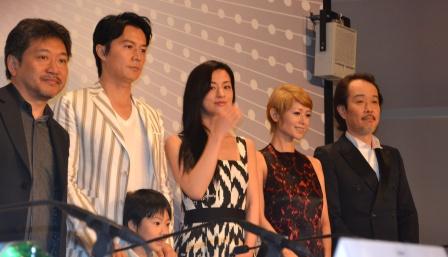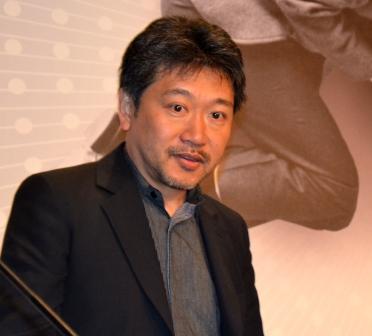The story is as simple and clean as director Kore-eda's filmmaking style: an upper class couple discovers that their beloved child, aged five, is actually not their own. The child had been swapped at birth in the hospital with another. What follows is the drama of what will the parents do about it, which involves emotional encounters with the parents of their own blood son and a test experience of swapping back.
director with cast
It is a beautiful film that takes place in contemporary sets: the living room of Japanese homes, the playground, the mall. Audiences at Cannes loved this film for its purity of form, and for the very contemporary topic. It probes what it means to have blood ties, opined many critics.
But for me, Like Father, Like Son, is mostly a story about a father learning how to become a real father, whether blood-related or not. The lead father, played stoically by Fukuyama Masaharu, is a grim, proper Japanese businessman who lives in a sterile mod apartment, designed with black couches and onyx appliances, who thinks, at one point, that maybe money will solve everything. He rarely smiles or looks anything but uncomfortable. While he is choosing whether or not to take back his biological boy, the boy, we intuit, is wondering, in his innocent way, whether he would enjoy this new play-unfriendly environment.
The other father, in contrast, works in a repair shop, lives in a messy cramped apartment, and chews his straw loudly when he sips his coke. This hirsute father is full of laughter and is constantly gathering all his children around his knee. "Hey, you don't take baths with your son?" he asks, shocked, to his upper class double. A shot follows of him gaily bathing with both the sons, squirting water into the face of one. The tiny boy, used to the sterile upper class life, grins with joy.
I asked Kore-Eda whether he thought it was difficult for a father to be playful.
He grinned as he answered.
"Many men can't play in Japan. For example, my father never played with us children. My father never even taught me how to fly a kite, which is why in the film the boy doesn't know how to fly a kite. Many fathers are like that in Japan because of the traditional rules about what it means to be a man. A father should not smile in front of the children. All boys, including small children, cannot go into the kitchen. This is why I cannot cook myself. I never went into the kitchen with my mother."
He pointed to the brochure of his film. "See this picture of the families together? Here, the wives make decisions, which the husbands listen to. But in traditional Japan, the father--the man--is the chief of the family. I, for example, was the baby boy in my family, with two older sisters. So when it came to eating, I was always served the first bite. And I got the best room in the house, with the sunny view!" He laughed. "Of course, things are changing now."
How about the critique of contemporary bourgeois life? Kore-eda's film makes the upper class mod apartment look cold and uninviting. The biological boy, when he sees the home where he "belongs", says: "Oh, you live in a hotel."
The director laughed. "I too live in an apartment that looks like a hotel, just like that one. If you are in Tokyo, most Japanese do. When my mother-in-law came to visit for the first time to our modern flat, I asked her if she wanted to stay the night. She said: 'Very beautiful place. Very beautiful. But I couldn't settle down in such a modern place.' She did not stay.'"
The issue of whether it is important that a child is your flesh and blood, is, however, the main issue discussed in the film. Would it matter to Kore-eda, father of a five year old girl himself, if he discovered his daughter was not his own?
"What I have learned in being a father is that it is not blood that counts, but the amount of time you spend with your child. However, in Japan, it is very important that your child is your biological child. Blood lines are important. In fact, adoption is not so prevalent in Japan."
A final question for Kore-Eda. In his acclaimed film Afterlife, he interviews real people about what one moment of their life they would choose to take with them, in the afterlife, to live for eternity.
What would his be?
Grinning, he immediately came up with an answer:
"I want to be on a film set making films. I have made nine films, and that's where I would like to spend eternity, making them."


